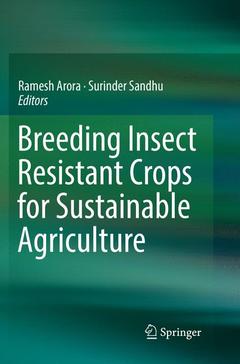Breeding Insect Resistant Crops for Sustainable Agriculture, Softcover reprint of the original 1st ed. 2017

This book reviews and synthesizes the recent advances in exploiting host plant resistance to insects, highlighting the role of molecular techniques in breeding insect resistant crops. It also provides an overview of the fascinating field of insect-plant relationships, which is fundamental to the study of host-plant resistance to insects. Further, it discusses the conventional and molecular techniques utilized/useful in breeding for resistance to insect-pests including back-cross breeding, modified population improvement methods for insect resistance, marker-assisted backcrossing to expedite the breeding process, identification and validation of new insect-resistance genes and their potential for utilization, genomics, metabolomics, transgenesis and RNAi. Lastly, it analyzes the successes, limitations and prospects for the development of insect-resistant cultivars of rice, maize, sorghum and millet, cotton, rapeseed, legumes and fruit crops, and highlights strategies for management of insect biotypes that limit the success and durability of insect-resistant cultivators in the field.
Arthropod pests act as major constraints in the agro-ecosystem. It has been estimated that arthropod pests may be destroying around one-fifth of the global agricultural production/potential production every year. Further, the losses are considerably higher in the developing tropics of Asia and Africa, which are already battling severe food shortage. Integrated pest management (IPM) has emerged as the dominant paradigm for minimizing damage by the insects and non-insect pests over the last 50 years. Pest resistant cultivars represent one of the most environmentally benign, economically viable and ecologically sustainable options for utilization in IPM programs. Hundreds of insect-resistant cultivars of rice, wheat, maize, sorghum, cotton, sugarcane and other crops have been developed worldwide and are extensively grown for increasing and/or stabilizing crop productivity.The annual economic value of arthropod resistance genes developed in global agriculture has been estimated to be greater than US$ 2 billion
Despite the impressive achievements and even greater potential in minimizing pest- related losses, only a handful of books have been published on the topic of host-plant resistance to insects. This book fills this wide gap in the literature on breeding insect- resistant crops. It is aimed at plant breeders, entomologists, plant biotechnologists and IPM experts, as well as those working on sustainable agriculture and food security.
Chapter 1. Insect-Plant Inter-Relationships.- Chapter 2. Insect Pests and Crop Losses.- Chapter 3. Advances in Breeding for Insect Resistance.- Chapter 4. Advances in Breeding for Resistance to Hoppers in Rice.- Chapter 5. Identification and Utilization of Resistance to Insect Pests in Grain Legumes: Progress and Limitations .- Chapter 6. Breeding for Aphid Resistance in Rapeseed Mustard.- Chapter 7. Breeding for Resistance to Insect Pests in Maize.- Chapter 8. Breeding for Insect Resistance in Sorghum and Millets.- Chapter 9. Incorporating Resistance to Insect-Pests in Cotton Cultivars-An Arduous Journey.- Chapter 10. Breeding Avenues in Fruit Crops for Imparting Resistance against Insect Pests.- Chapter 11. Breeding for Stem borer and Gall midge Resistance in Rice.- Chapter 12. Breeding for Insect Resistance in Mung bean and Urd bean.- Chapter 13. Insect Biotypes and Host Plant Resistance.
Dr. Ramesh Arora, Professor of Entomology at Eternal University, Baru Sahib, HP, India holds a Ph.D. in Entomology (1990) from Punjab Agricultural University, Ludhiana, Punjab, India. He also served there for more than 37 years as a researcher in various capacities. His research interests include development and dissemination of IPM in cotton, vegetables, oilseeds and forage crops; and climate resilient pest management. Dr. Arora has nearly 300 publications, including 90 research articles in refereed national and international journals and 100 conference/symposia presentations. He has also authored/edited 14 books on entomology, pest management and sustainable agriculture and contributed 42 book chapters in edited books published by leading publishers. He has been involved in designing course curricula and teaching UG and PG courses in Entomology. He has guided the research work of more than 30 PG students in Entomology, Plant Pathology, Zoology, Microbiology, Biochemistry, Agricultural Biotechnology and Extension Education. Dr. Arora is associated with several professional societies as vice president/ general secretary/ editor-in-chief/ EC member and has served as organizing secretary / co-organizing secretary / member of the organizing committee of more than a dozen international and national conferences/ seminars/ symposia.
Dr. Surinder Sandhu is Professor of Plant Breeding at Punjab Agricultural University (PAU), Ludhiana, Punjab. She received her Ph.D. in Genetics (Minor-Plant Breeding) from PAU, Ludhiana in 1995 and won the prestigious J L Nehru Award for outstanding Post Graduate Research in Agriculture from ICAR, New Delhi. She started her research career as scientist (crop Improvement) (1995-2002) at the ICAR-Central Potato Research Institute’s Regional Station, Jalandhar. Later, she became a sugarcane breeder (2002-2010) at PAU, Ludhiana. She served as a research scholar at the University of Florida, Gainesville, U.S.A. from December, 2007 to Ju
Date de parution : 12-2018
Ouvrage de 421 p.
15.5x23.5 cm
Date de parution : 11-2017
Ouvrage de 421 p.
15.5x23.5 cm
Disponible chez l'éditeur (délai d'approvisionnement : 15 jours).
Prix indicatif 179,34 €
Ajouter au panier


